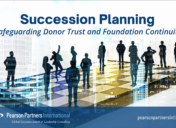Case Study: Greyhound
Executives in Transition: Nothing But the Best for Greyhound’s Best and Brightest
![]() When Greyhound decided to move many of its shared service functions to its parent company, even top-level employees were not immune to the layoffs. Knowing that these valued executives would face a tough job market, Rhonda MacAndrew, Greyhound’s senior vice president, human resources, wanted to be sure they had every opportunity to successfully transition into new jobs.
When Greyhound decided to move many of its shared service functions to its parent company, even top-level employees were not immune to the layoffs. Knowing that these valued executives would face a tough job market, Rhonda MacAndrew, Greyhound’s senior vice president, human resources, wanted to be sure they had every opportunity to successfully transition into new jobs.
“I think our employees are one of our strongest assets,” MacAndrew says. “When someone leaves the organization, particularly at a senior level, they still can represent the company in one way or another, and that has a lot to do with how Greyhound is viewed in the community-in a positive way or in a negative way. I would much rather that someone feel that we’ve gone out of our way and done things to support them in their transition, so that the feeling they have about the company is a positive one.”
Helping departing executives not only boosts Greyhound’s reputation as a company that treats its people with respect, it shows the employees who remain that the company’s leaders care. Because Greyhound wanted to give its departing executives the best career transition services available, the company chose Pearson Partners International. Some of the executives who were let go took advantage of the transition services immediately, while others waited several months to take the first step. But all had one thing in common: they were pleasantly surprised at the breadth of services provided by Pearson Partners and the value they brought to their job search.
Career Coaching
“It is important to have services provided that are holistic,” MacAndrew says. “There are lots of dynamics aside from just helping somebody put their resume together or helping them in regards to how they do their elevator speech. There are lots of people who take losing their job very personally. They need some coaching, possibly in regard to their overall self esteem. There may be challenges or issues with their families. These things are important, and I want somebody working with those people to help them address those issues.”
Some executives have spent years or even decades making million-dollar decisions, but have very little experience looking for a job. For example, Mark Southerst left his position as general counsel and secretary after serving 20 years with Greyhound, so it had literally been decades since he’d had to update a resume, dust off his interviewing skills, or assess his strengths and weaknesses.
“The most valuable part of these services has been inventorying my skills, understanding my personality traits, understanding my strengths and weaknesses, and being able to highlight my experience and put emphasis on certain parts of my experience,” says Southerst, who is now chief legal officer and secretary for United Vision Logistics in Lafayette, La.
In addition to developing a high-quality resume and practicing interviewing skills, Pearson Partners’ career transition services include personal assessment and coaching; research on target companies; networking and connection-making; and evaluation of specific opportunities, from cultural fit to compensation. Before any interview, Pearson Partners’ executive coaches work closely with the candidate to deeply understand the interviewing company’s mission, vision, culture, and management team.
“What it enabled me to do was to think of the type of opportunities and the key characteristics that would work for me, what industries, what type of reporting relationship or corporate structure that I thought I would thrive in,” Southerst says. “As you do your interviews, you begin to focus not only on making sure you present yourself well, but also looking to see whether you will be the right fit and being realistic about it.”
For Krista Robinson, Greyhound’s former vice president, supply chain, who is now vice president of procurement at DynCorp International, Pearson Partners’ transition services went far beyond the outplacement services she’d sourced for others during her career.
“I thought I knew a lot about what would happen—you would go to class; sit around with other depressed, shocked people; get some resume feedback,” she says. “But it was nothing like that. Pearson is really executive coaching and networking, which is different than outplacement services. This is to help you get through a rough period in your life, to pick your next opportunity, and for it to be a better fit so you can stay a long time.”
After being unexpectedly laid off less than a year after coming on board at Greyhound, Robinson found the assessment particularly valuable. “After you have had something like this happen to you, even if you were removed from your job and it wasn’t because of your performance, it still feels personal. So it’s good to have professionals evaluate you and to hear the good things about you. You are not alone; you have people in your corner who root for you and give you some tools to research and filter opportunities.”
Jeff Altizer, C.P.A., Greyhound’s former chief financial officer who is currently working as a freelance consultant, found the custom research and networking opportunities highly valuable. “The fact that Pearson is a retained search firm has given me more access than I gave it credit for at first to leverage their aspects and networks,” he says. “It is more hands-on than just ‘here’s our toolkit.’ For me, I need a sounding board and someone to give me industry perspective, facts, and the data I need to make confident decisions, and Pearson Partners provides that.”
Network Building
Southerst, Greyhound’s former general counsel and secretary, carefully researched the various outplacement services firms after assisting with the transition and then leaving the company. He chose Pearson Partners in part because he wanted one-on-one assistance, and also because of the company’s connections and assistance with building not just a network, but the networking skills to grow and sustain it.
MacAndrew is also impressed that Pearson Partners goes beyond most other career transition companies by offering personal networking services. That’s especially important, she believes, for senior-level executives, who may require additional time and extensive networking to identify companies and opportunities that are a good fit both culturally and professionally.
“Pearson Partners has a very strong connection in the marketplace, providing personal networking with individuals that brings leads to people who are transitioning, and I think that’s extremely positive,” she says. “Part of that is because Pearson Partners does executive search as well.”
For example, executive job-seekers can ask Pearson Partners to research companies they’re interested in, and will get detailed company information and in many cases, names and contact information for people Pearson has placed or worked with in the past. In some cases, Pearson’s executives are able to make phone calls and open doors on behalf of transitioning executives.
The former Greyhound executives were also invited to attend Pearson Partners’ quarterly breakfast events, where they could meet and network with business leaders from across the area.
Ultimately, for these executives who moved on from Greyhound into new roles, Pearson Partners served as a sounding board, coach, network, research organization, and more.
“An executive is accustomed to having a team supporting them to facilitate decision-making,” Altizer explains. “Pearson Partners are, in essence, my management team for the job search.”















